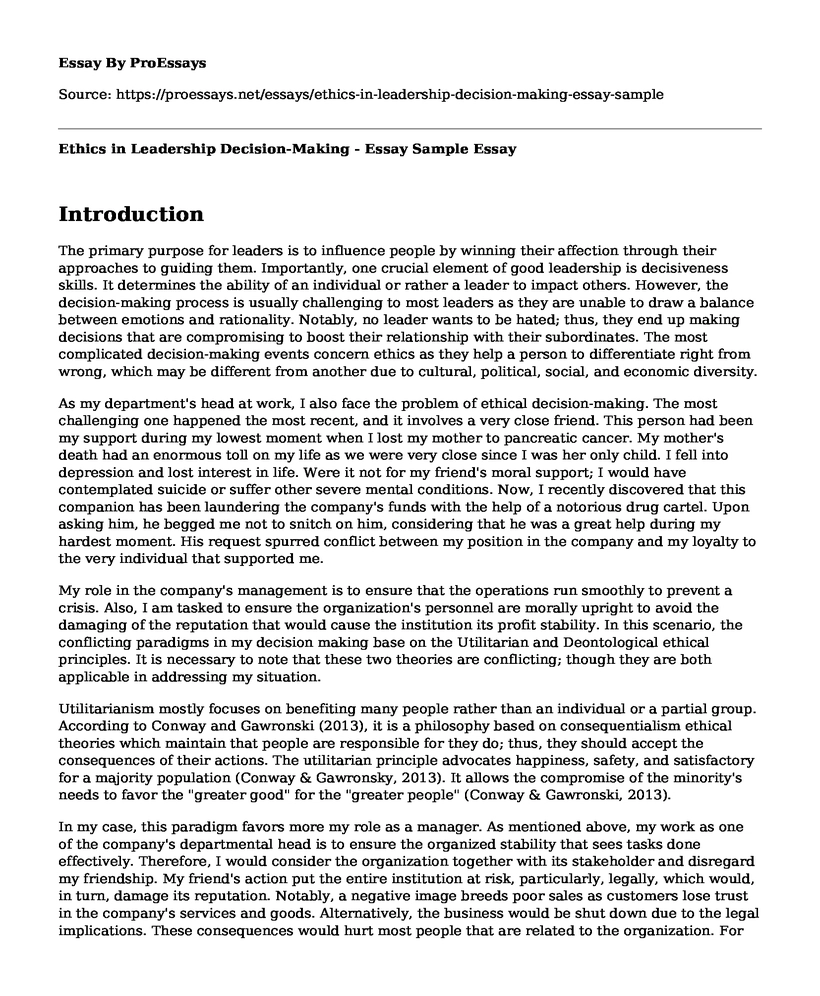Introduction
The primary purpose for leaders is to influence people by winning their affection through their approaches to guiding them. Importantly, one crucial element of good leadership is decisiveness skills. It determines the ability of an individual or rather a leader to impact others. However, the decision-making process is usually challenging to most leaders as they are unable to draw a balance between emotions and rationality. Notably, no leader wants to be hated; thus, they end up making decisions that are compromising to boost their relationship with their subordinates. The most complicated decision-making events concern ethics as they help a person to differentiate right from wrong, which may be different from another due to cultural, political, social, and economic diversity.
As my department's head at work, I also face the problem of ethical decision-making. The most challenging one happened the most recent, and it involves a very close friend. This person had been my support during my lowest moment when I lost my mother to pancreatic cancer. My mother's death had an enormous toll on my life as we were very close since I was her only child. I fell into depression and lost interest in life. Were it not for my friend's moral support; I would have contemplated suicide or suffer other severe mental conditions. Now, I recently discovered that this companion has been laundering the company's funds with the help of a notorious drug cartel. Upon asking him, he begged me not to snitch on him, considering that he was a great help during my hardest moment. His request spurred conflict between my position in the company and my loyalty to the very individual that supported me.
My role in the company's management is to ensure that the operations run smoothly to prevent a crisis. Also, I am tasked to ensure the organization's personnel are morally upright to avoid the damaging of the reputation that would cause the institution its profit stability. In this scenario, the conflicting paradigms in my decision making base on the Utilitarian and Deontological ethical principles. It is necessary to note that these two theories are conflicting; though they are both applicable in addressing my situation.
Utilitarianism mostly focuses on benefiting many people rather than an individual or a partial group. According to Conway and Gawronski (2013), it is a philosophy based on consequentialism ethical theories which maintain that people are responsible for they do; thus, they should accept the consequences of their actions. The utilitarian principle advocates happiness, safety, and satisfactory for a majority population (Conway & Gawronsky, 2013). It allows the compromise of the minority's needs to favor the "greater good" for the "greater people" (Conway & Gawronski, 2013).
In my case, this paradigm favors more my role as a manager. As mentioned above, my work as one of the company's departmental head is to ensure the organized stability that sees tasks done effectively. Therefore, I would consider the organization together with its stakeholder and disregard my friendship. My friend's action put the entire institution at risk, particularly, legally, which would, in turn, damage its reputation. Notably, a negative image breeds poor sales as customers lose trust in the company's services and goods. Alternatively, the business would be shut down due to the legal implications. These consequences would hurt most people that are related to the organization. For instance, many people may lose jobs, and the state may run short of taxation income.
On the other hand, deontologists affirm loyalty and commitment among people. As noted by Conway and Gawronski (2013), deontology ethics involves paying duty and pledge. The principles and policies based on this theory, emphasize the connection between commitment and how people treat one another (Conway & Gawronski, 2013). Importantly, the decision based on this approach can be defined as "Pay good with good" and "Pay evil with evil." Conway and Gawronski (2013) insisted that deontology is beneficial in inter-relations as the relationship is built on trust.
Considering the deontological concept, I owe to my friend; thus, I should be on his side. I should repay his kindness and loyalty to me during a time that I needed support the most by covering for his actions. He committed his friendship to me after my mother's demise and helped me to be stable again. Therefore, I should I rethink his kind actions towards me before selling him out to the authorities and management. I will be doing him a favor to repay for his care and concernedness.
Conclusion
In conclusion, decision-making in leadership is tricky as it majorly involves pleasing people to win their affection. Notably, it is vital to note that ineffective decisiveness can lead an individual or an entire institution to trouble. Also, as much as ethical theories are considerate in making fair decisions, they cause conflict and confusion as they are interpreted differently in various societal divisions. However, it is inconsiderate to make decisions that would compromise many people's wellness
References
Conway, P., & Gawronski, B. (2013). Deontological and utilitarian inclinations in moral decision making: a process dissociation approach. Journal of personality and social psychology, 104(2), 216.
Cite this page
Ethics in Leadership Decision-Making - Essay Sample. (2023, Jan 16). Retrieved from https://proessays.net/essays/ethics-in-leadership-decision-making-essay-sample
If you are the original author of this essay and no longer wish to have it published on the ProEssays website, please click below to request its removal:
- Incorporating the Evidence in Data-Driven Decision Making Essay
- Business Ethics Reflection Essay Example
- Leadership: Jack Ma Model of Ethical Leadership - Essay Sample
- Essay Example on American Business Culture: An Inclusive Land of Opportunity
- Paper Example on Sears' Failure: Lack of Leadership Leads to Inefficient Platforms
- Paper Sample: Engagement in Professional Nursing
- Confucian Principles in Government: Examining Harmony, Education, and Leadership - Essay Example







